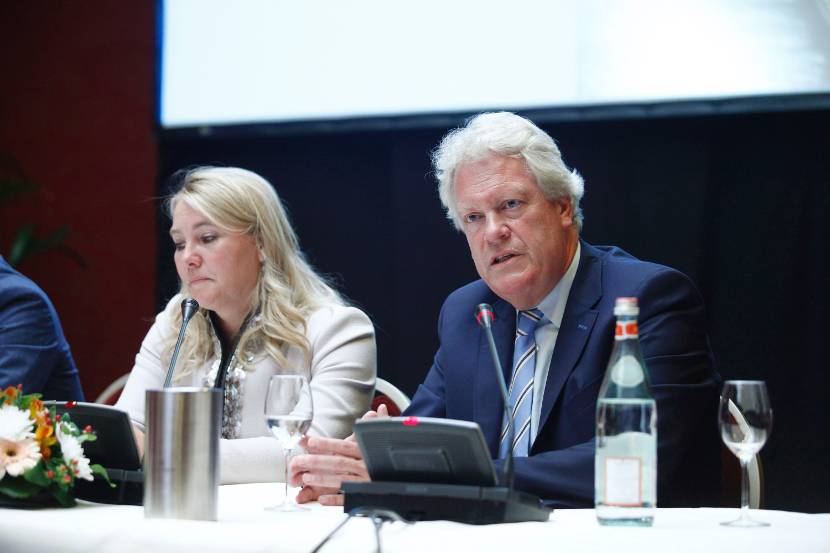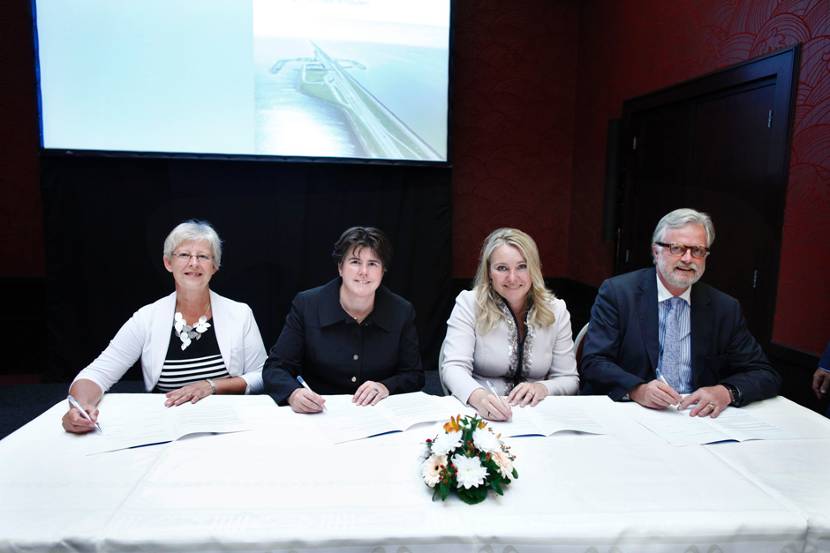Delta Programme 2015: a safe and liveable country in the 21st century
The Netherlands has a new Delta Plan containing decisions and strategies aimed at protecting our country from flooding and ensuring an adequate freshwater supply in the decades ahead. The national government, provinces, water boards and municipalities will be working together to make the spatial design of the Netherlands more robust and resilient to extreme weather. The objective is for the Netherlands to be liveable, habitable and economically strong in the 21st century.
This is set down in the Delta Programme 2015: Decisions for Keeping the Netherlands Liveable, that Minister Schultz van Haegen (Infrastructure and the Environment) submitted to the House of Representatives today. The Delta Decisions follow the recommendations on which Delta Commissioner Wim Kuijken worked on since 2010.

Minister Schultz: “Today we begin a new chapter in our centuries-old relationship with water. Almost 60 years ago, the first Delta Plan resulted in the construction of the Delta Works which have since provided decades of protection. Today we have a new Delta Plan for the decades ahead. Many more people now live in low-lying areas. Our economic activities there have grown significantly. And, due to climate change, the sea level is rising and our rivers have more water. It is therefore time for a new Delta Plan that provides for additional protection.”
Mr Kuijken: “I am proud that over the past years, as Delta Commissioner, I was able to prepare and flesh out these decisions and strategies, and make a well-substantiated proposal for decisions with structuring effects on behalf of the authorities involved (municipalities, provinces, water boards and the national government) and many civil society organisations. I am pleased by the Cabinet’s positive reaction. The Delta Act of 2012 has been an enormous help. In the years ahead, will do my utmost to make progress on these decisions and convert them into concrete measures. This means that we will have to continue to work hard for more than 30 years, and spend some 20 billion euros from the Delta Fund.
Delta Decisions
The Delta Programme 2015 contains the national Delta Decisions and concrete preferred strategies for each region. Together, they constitute the roadmap for our work on the delta up until 2050. The decisions involve:
- Water Safety: we are affording the Netherlands better flood protection with new safety standards for our water defences. We are not only looking at the risk of dikes being breached, but also at the ensuing consequences for residents and the economy alike. Instead of different safety levels in different parts of the country, in the future, everyone living behind the dikes can count on the same basic protection level with a risk of fatalities due to flooding that is no higher than 1 in 100,000 per year. In other words, for everyone and everywhere , the annual risk of death as a result of flooding must be no higher than 0.001 percent. We will ensure that places where many casualties and significant loss could occur receive additional protection. Heavy investments will be made in the Rivers Region, in particular. The Delta Programme 2015 provides new standards for over 200 dike sections. The new standards will be embedded in law.
- Freshwater Supply: we will ensure the freshwater supply is improved to arm ourselves against salinisation and longer dry spells. The national government, provinces, municipalities and water boards are making agreements to prevent shortages of fresh water and drinking water from disrupting the agricultural sector, the natural environment, public utilities and the economy, and to ensure that fresh water is used more efficiently. There is a new approach for high-lying areas, such as De Peel, and areas in which saline intrusion is a threat, including parts of the south-western Netherlands. In the years ahead, the national government and the region will invest more than 450 million euros in the freshwater supply.
- Spatial Adaptation: today, all authorities are making an important agreement on the water-robust design of towns and villages, and on giving water more room where necessary. This can be done, for instance, by collecting water in water squares, building floating houses, placing more greenery or relocating vital infrastructure. The aim is that the whole of the Netherlands will be designed in a climate-proof way by 2050.
- Rhine-Meuse Delta: the area in which the Rhine and Meuse flow into the North Sea, with the port of Rotterdam and many surrounding towns, will be better protected. This is one of the most vulnerable places in the Netherlands, a place where many people live and a lot of money is earned. The dikes will strengthened and the spatial design of the area will be made more water-robust. We are investigating whether the capacity of the rivers can be increased and we are improving the effectiveness of the Maeslant barrier (the area’s major defence against the sea).
- IJsselmeer Region: by applying flexible water level management for the IJsselmeer, we can store more fresh water and use stocks better. We are using pumps in the Closure Dike to ensure that water can be properly discharged when necessary. The banks of the IJsselmeer need to be designed to suit flexible water level management.
In addition, we have made a strategic Decision on Sand: we will maintain our coastline using beach nourishment and we will strengthen the economy along the coast.
Prepared and flexible
In the Netherlands, our work on the delta will never be done. We are safe, but our delta is vulnerable. We need to work at a faster pace to protect our growing population and significantly higher economic value, today and in the future. With the Delta Decisions, the Netherlands is prepared for multiple situations. We have chosen to be flexible because the future is uncertain. We know that the sea level and weather patterns are changing, but we do not know exactly how. The Delta Programme 2015 contains an adaptive approach which can be used to continue to adapt our delta to unexpected developments, new measurements and insights. We are staying pragmatic and alert.

Administrative agreement
Today, Minister Schultz and representatives from the provinces, water boards and municipalities will sign the Administrative Agreement on the Delta Programme, in which all parties agree to embed the Delta Decisions and preferred strategies in their own plans. The Delta Commissioner prepared this administrative agreement which is supplementary to the Administrative Agreement on Water of 2011. The national government will set down the Delta Decisions and preferred strategies in an interim amendment to the National Water Plan. The law will also be amended in order to apply the new water safety standards.